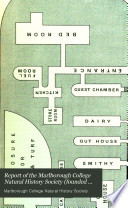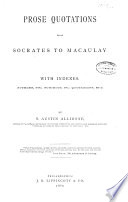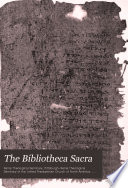 | Marlborough College (Marlborough, England). Natural History Society - 1877 - 606 pages
...that these primitive particles, being solids, are incomparably harder than any porous body composed of them ; even so very hard as never to wear or break...what God himself made one in the first creation." In 1808 John Dalton, of Manchester, published his new system of chemical philosophy. This system was... | |
 | Samuel Austin Allibone - 1880 - 772 pages
...incomparably harder lhan any porous bodies compounded of them : even so very hard as never to wear or break in pieces; no ordinary power being able to divide what God himself made one in the first creation. SIR ISAAC NEWTON. These nobler faculties of the mind, matter organized could never produce. RAY. 462... | |
 | Philosophical Society of Washington (Washington, D.C.) - 1881 - 902 pages
...incomparably harder than any porous bodies compounded of them, even so very hard as never to wear or break in pieces — no ordinary power being able to divide what God himself made one in the first creation." This definition reminds us of Lucretius. In continuation Newton adds : " While the particles continue... | |
 | 1888 - 938 pages
...incomparably harder than any porous bodies compounded of them, even so very hard as never to wear or break in pieces — no ordinary power being able to divide what God himself made one in the first creation." This definition reminds us of Lucretius. In continuation Newton adds: "While the particles continue... | |
 | Henry Enfield Roscoe - 1895 - 234 pages
...incomparably harder than any porous bodies compounded of them ; even so very hard as never to wear or break in pieces, no. ordinary power being able to divide what God Himself made one in the first creation. While the particles continue entire they may compose bodies of one and the same nature and texture... | |
 | Henry Enfield Roscoe - 1895 - 236 pages
...incomparably harder than any porous bodies compounded of them ; even so very hard as never to wear or break in pieces, no ordinary power being able to divide what God Himself made one in the first creationj While the particles continue entire they may compose bodies of one and the same nature and... | |
 | George Frederick Wright - 1897 - 396 pages
...incomparably harder than any porous bodies compounded of them; even so very hard as never to wear or break in pieces; no ordinary power being able to divide what God himself made one in the first creation." * But this supposition of the impenetrability and consequent inelasticity of the ultimate atoms involves... | |
 | 1897 - 840 pages
...harder than any porous bodies compounded of them ; even so very hard as . never to wear or break in pieces; no ordinary power being able to divide what God himself made one in the first creation." l But this supposition of the impenetrability and consequent inelasticity of the ultimate atoms involves... | |
 | Carl Snyder - 1903 - 410 pages
...incomparably harder than any porous bodies compounded of them; even so very hard as never to wear or break in pieces; no ordinary power being able to divide what God himself made one in the first creation. SIR ISAAC NEWTON, Optiks. THE SEARCH FOR PRIMAL MATTER SOME account has already been given of how Sir... | |
 | 1903 - 476 pages
...incomparably harder than any porous body compounded of them; even so very hard as never to wear or break in pieces, no ordinary power being able to divide what God Himself made one in the beginning."* The indivisibility of these atoms was a pure assumption on the part of Newton. In fact,... | |
| |